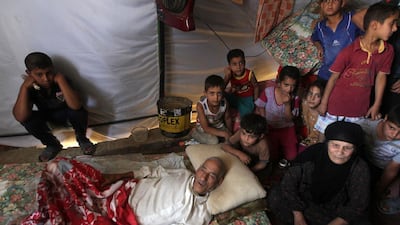BAGHDAD // Shiite militias converged on Ramadi on Monday in a bid to wrest the city back from ISIL fighters who seized it in a deadly three-day blitz, dealing a stinging blow to the Iraqi government.
The loss of the capital of Iraq’s largest province was Baghdad’s worst military setback since it started clawing back territory from the militant group late last year.
It comes days after a rare message from ISIL leader Abu Bakr Al Baghdadi urging mass mobilisation.
Iraqi prime minister Haider Al Abadi had been reluctant to deploy Shiite militias to Anbar province for fear of alienating its overwhelmingly Sunni Arab population. He favoured developing locally recruited forces, a policy that had strong US support.
But militia commanders said on Monday that Ramadi’s fall had shown that the government could not do without the Popular Mobilisation units, or Hashed Al Shaabi.
Badr militia chief Hadi Al Ameri said the province’s leaders should have taken up his offer of help sooner.
The group’s Al Ghadeer television said Mr Al Ameri “holds the political representatives of Anbar responsible for the fall of Ramadi because they objected to the participation of Hashed Al Shaabi in the defence of their own people”.
Various militias announced they had units already in Anbar -- including around the cities of Fallujah and Habbaniyah -- ready to close in on Ramadi and engage ISIL fighters in the city.
A spokesman for Ketaeb Hizbollah, one of the leading Shiite paramilitary groups, said his organisation had units ready to join the Ramadi front from three directions.
“Tomorrow, God willing, these reinforcements will continue towards Anbar and Ramadi and the start of operations to cleanse the areas recently captured by Daesh will be announced,” Jaafar Al Husseini said, using an Arabic acronym for ISIL.
Asaib Ahl Al Haq, one of the groups that has most routinely been accused of abuses, said it was discussing the details of its deployment with the government.
“We have more than 3,000 fighters waiting for a signal from the secretary general [of Asaib] Sheikh Qais Al Khazali,” spokesman Jawad Al Talabawi said.
The fall of Ramadi, some 100 kilometres west of Baghdad, came when beleaguered security forces pulled out of their last bases on Sunday.
The extremists used several waves of suicide car bombs to thrust into government-controlled neighbourhoods on Thursday and Friday.
The black flag of ISIL was soon flying over the provincial headquarters and, with reinforcements slow to come, thousands of families fled the city.
Anbar officials said at least 500 people died in three days.
“We’re continuing to monitor reports of tough fighting in Ramadi and the situation remains fluid and contested,” Pentagon spokeswoman Maureen Schumann said on Sunday.
Muhannad Haimour, spokesman and adviser to the Anbar governor, said fighting was continuing in some pockets of the city. Iraqi military officials said all main security bases had been abandoned.
Tensions between Tehran and Washington, Baghdad’s two main foreign partners, also played out during the battle for executed dictator Saddam Hussein’s hometown of Tikrit, which the government took back last month.
Meanwhile, a spokesman for the governor of Iraq’s Anbar province said about 500 people – both civilians and Iraqi soldiers – are estimated to have been killed over the last few days as the city of Ramadi fell to the ISIL group.
Muhannad Haimour also said on Monday that “approximately 8,000 have fled” Ramadi. He said the figure is in addition to the mass exodus in April, when the UN said as many as 114,000 residents fled from Ramadi and surrounding villages at the height of the violence.
Local officials have said that ISIL carried out mass killings of Iraqi security forces and civilians.
ISIL seized control of the Anbar provincial capital on Sunday, sending Iraqi forces fleeing in a major loss despite the support of US-led airstrikes targeting the extremists.
Mr Al Abadi met the head of US Central Command, General Lloyd Austin, on Sunday, and on Monday Iranian defence minister Hossein Dehghan arrived in Baghdad for talks.
* Agence France-Presse and Associated Press

